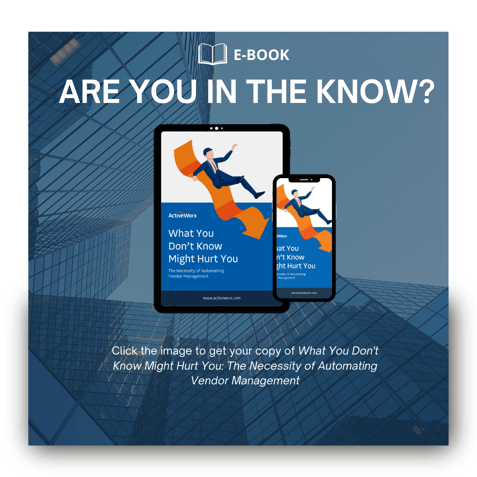How to Enhance Vendor Satisfaction with a Self-Service Portal
 Welcome to the Age of the Customer. Perhaps you're thinking, "But it's always been about the customer!" Yes, that's true, but the way in which we establish and grow customer relationships continues to change, and this means we need to regularly update our tools, methodologies, and approach.
Welcome to the Age of the Customer. Perhaps you're thinking, "But it's always been about the customer!" Yes, that's true, but the way in which we establish and grow customer relationships continues to change, and this means we need to regularly update our tools, methodologies, and approach.
Whether it's ordering groceries through a mobile application or applying for a home equity loan online, customers expect the way they transact and interact with businesses to be fast and easy.
One misstep in a customer's interaction with a seller could negatively affect your bottom line.
The business world has ever-increasing expectations for what makes an exceptional customer experience. Vendors expect their dealings with customers to be quick and straightforward. After all, who has the time for back-and-forth e-mails, calls, and error-prone processes?
This has big implications for accounts payable (AP) departments.
The level of service that an AP department provides its vendors is often lost in all the talk about reducing invoice processing costs, increasing staff productivity, or capturing more card rebates.
.jpeg?width=657&name=Blog%20Callouts%20(1).jpeg)
Yet enabling your vendors with a self-service portal can have a big impact on the level of service an AP department provides. A self-service portal enables vendors to enter and update their company information, verify tax identification number and banking details, upload necessary tax forms, electronically submit invoices, and check on the status of invoices and payments 24/7/365.
What vendors like about self-service portals
- Streamlined processes. A self-service portal makes it easy for a vendor to submit the information required for onboarding and registration. No more e-mails, telephone calls, or paper forms. No more wondering where they stand in the onboarding process. No chance of typos or lost documents. And no need to send banking information and other sensitive data through e-mail. What’s more, vendors can update their contact information and banking details, when necessary, reducing the risk of fraud or the possibility of payment delays.
- Instant access to information. Almost one-quarter of AP leaders surveyed by the Institute of Finance and Management (IOFM) say that responding to vendor inquiries is the biggest challenge that they face as their staff works remotely. Cash-strapped vendors are making more calls and e-mails to understand where their payments stand. And it’s harder for AP staff to track down information about the status of vendor payments when they work from home. Complicating matters, some vendors call or e-mail the person they purchased the goods or services from to get to the bottom of things.
That requires the purchaser to call or e-mail their AP counterparts for clarification. Most of the time, vendors simply want to know whether their invoice was received, whether their invoice was paid, when their invoice will be paid, or the check number of their payment. The time that AP spends tracking down this information and calling or e-mailing vendors back with what they found is time that can’t be spent on growth-generating activities. And the longer a vendor waits to hear back, the more likely they are to call or e-mail again or become frustrated. A self-service portal provides vendors with instant answers to their most common questions, any time of the day. - Peace of mind. Few things are as unnerving for vendors as sending their sensitive data via e-mail. There’s no telling who could intercept the information. With a self-service portal, vendors don’t have to e-mail or call their customers to provide or update their contact details of banking information. The vendor can input the data themselves in the vendor portal.
The level of service that a business provides is a key differentiator of success. Vendors expect transactions and interactions with their customers to be fast and easy. The exceptional service that a vendor portal provides helps a company stand out as one that vendors want to do business with.
For more discussion on vendor management, check out our e-book: What You Don't Know Might Hurt You.


